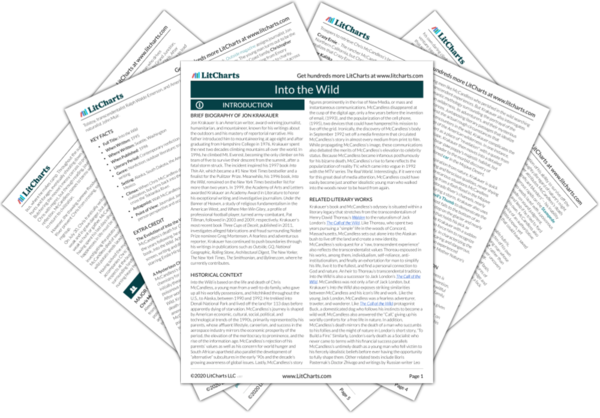Summary
Analysis
Author, journalist, and narrator Jon Krakauer, introduces Into the Wild by presenting the circumstances surrounding the death of Christopher McCandless: “In April 1992, a young man from a well-to-do East Coast family hitchhiked to Alaska and walked alone into the wilderness north of Mt. McKinley. Four months later his decomposed body was found by a party of moose hunters.”
Jon Krakauer’s introduction, reads like a newspaper article, speaking to the author’s journalistic background, but it also sounds like the start of a mystery novel. Krakauer’s statement of the facts invites the reader to wonder: why does a wealthy young man wander into the wilderness alone and how does he come to die?
Themes
Asked by Outside magazine to cover the story, Jon Krakauer investigates McCandless’ life and death. Krakauer gives a brief account of McCandless, reporting that he grew up in an affluent suburb of Washington D.C., where he was a star-student and elite athlete. After graduating with honors from Emory University in the summer of 1990, McCandless went off the grid by changing his name, donating the remainder of his college savings to charity, abandoning his car, giving up his possessions, and burning all the cash in his wallet.
Krakauer presents these facts to explain his fascination with McCandless and intrigue the reader further. Educated, affluent and talented, McCandless appears to have led a happy and fortunate life, with a promising future. That he gives up all his worldly possessions makes his disappearance and death even more puzzling, enticing Krakauer and the reader to continue investigating.
Themes
“Working on a tight deadline,” Krakauer quickly publishes an article on McCandless’s death in Outside magazine in January 1993. But intrigued by the boy’s life, death, and travels, Krakauer continues to investigate the “convoluted path that led to his death,” culminating this research into the book before the reader, Into the Wild.
Krakauer’s prolonged investigation into McCandless’s death, from article to full-length book, highlights the pursuit of ideals. Just as McCandless pursues an idyllic life in the wild, Krakauer goes in search of answers that will ideally explain McCandless’s death.
Themes
Krakauer presents the thematic outline of his book, which explores the “grip wilderness has on the American imagination, the allure [of] high-risk activities…for young men of a certain mind, [and] the complicated, highly charged bond…between fathers and sons.”
Get the entire Into the Wild LitChart as a printable PDF.

Krakauer refuses to claim that he is an “impartial biographer” of McCandless, revealing that the boy’s story “struck a personal note.” While asserting his largely successful attempt at minimizing his “authorial presence,” Krakauer warns the reader that he interrupts McCandless’s story with narrative excerpts from his own youth.
Krakauer suggests that he is an unreliable narrator. By identifying with his subject, Krakauer undermines his objective journalistic training, creating a book that is not only a biography of McCandless’s life, but also a memoir of Krakauer’s own life.
Themes
Krakauer describes McCandless as an “extremely intense young man,” whose “streak of stubborn idealism…did not readily mesh with modern existence.” A devotee of Leo Tolstoy, McCandless emulated the Russian novelists’ renunciation of wealth and privilege for a simple and morally rigorous life in poverty.
By characterizing McCandless as an idealistic young man suggests that McCandless’s whole-hearted devotion is not sustainable, nor compatible with modern society. Yet by noting his connection to Leo Tolstoy, Krakauer indicates that McCandless is part of a tradition of such people, and that this sort of idealism can sometimes lead to greatness.
Themes
Krakauer claims that McCandless ventured into the Alaskan bush not pursuing illusions of a land filled with “milk and honey,” but in search of “peril and adversity.” He asserts that McCandless, during his sixteen weeks in the wild, “more than held his own,” and that he would have survived if were not for “two seemingly insignificant blunders.”
Like a detective, Krakauer indicates a motive for Chris’ pursuit of the wild and suggests a theory for his death. Contrary to Chris’ detractors, Krakauer believes that Chris actively pursued danger in life, but was undone by small and innocent mistakes, rather than arrogant ones. Put another way, Krakauer doesn’t condemn McCandless as being a fool. He respects him.
Themes
Noting the great number of mail correspondences and opinions McCandless’ story has generated—some readers believe he was noble and courageous, others assert that he was crazy, reckless and arrogant—Krakauer invites the reader “to form his or her own opinion,” saying that his own convictions will soon be made apparent.
Krakauer’s cover story elevates Chris’ death to the national stage, setting off a heated debate about Chris’ character that also compromises Krakauer’s journalistic integrity. By disclosing his bias, but also engaging diverse opinions, Krakauer reestablishes his position as a consummate investigative reporter.
Themes












